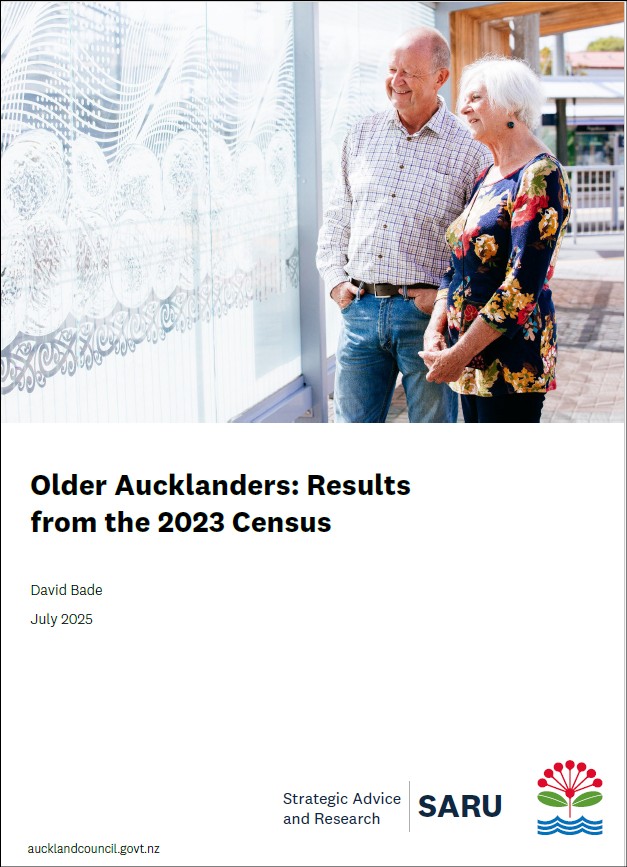Older Aucklanders: results from the 2023 census
Author:
David BadeSource:
Auckland Council Strategic Advice and Research Unit SARUPublication date:
2025Topics:
PeopleExecutive summary
This report presents an overview of older Aucklanders (65 years and older) in Tāmaki Makaurau / Auckland, based on data from the 2023 Census. The report outlines changes over time since the 2018 Census, and, where possible, the 2013 Census. For some topics, the older Aucklanders population is divided into three age brackets: 65 to 74 years, 75 to 84 years and 85 years and over, and, in other cases, comparisons are given in five-year subgroups.
In 2023, there were 219,753 Aucklanders aged 65 years and over, 13.3 per cent of the total Auckland population. The total number of older Aucklanders grew significantly between 2013 and 2023 (+56,595, +34.7%).
Key findings from the report are summarised below:
Geographical distribution
- The geographical distribution of older Aucklanders generally followed patterns of the population as a whole, with higher numbers in the isthmus and in the west, and lower numbers in rural areas in northern Auckland, and to the west of the city centre.
- The island local boards had the highest proportion of those 65 years and over of all the local board areas: Aotea / Great Barrier (25.9%) and Waiheke (24.2%).
- The local board areas in the southern urban area of Auckland had the lowest proportion of those 65 years and over: Ōtara-Papatoetoe (8.9%), Manurewa (9.2%), Māngere-Ōtāhuhu (9.5%) and Papakura (9.6%).
Broad demographics
- Slightly more Aucklanders 65 years and over identified as female (93,846, 54.2%) than male (79,146, 45.7%). A small number (234, 0.1%) identified with another gender.
- One in six (33,003, 16.6%) were categorised as disabled. Slightly higher proportion of females (18,912, 17.7%) were disabled compared to males (14,043, 15.3%), and those in the Pacific Peoples (30.2%) ethnic group had the highest proportion with a disability.
Ethnic and cultural diversity
- In 2023, two thirds (67.3%) of older Aucklanders were in the broad European ethnic category, equating to 219,753 people. The next largest group was those classified under the broad Asian category (21.0% or 46,218 people), followed by Pacific Peoples (7.9% or 17,397 people) and Māori (5.4% or 11,907 people).
- Although European ethnicity remains the highest proportion of all the ethnic groups, the proportion is declining steadily and all other ethnic groups increased between 2013 and 2023.
- One in 15 (6.6%) older Aucklanders in 2023 were of Māori descent. This is less than the rest of the population (14.9%).
- A lower proportion of older Aucklanders speak English (88.2%) compared to the rest of the population (92.9%).
- After English, the next most common language spoken was Northern Chinese (10,614 or 4.8%), followed by Yue (7761 or 3.5%) and Samoan (7566 or 3.4%).
- A total of 102,078 (46.9%) older Aucklanders were born overseas. This is a higher proportion than in 2018 (45.5%) and in 2013 (43.1%).
Dwellings and households
- In 2023, nearly all (200,316 or 95.2%) older Aucklanders lived in private dwellings. The remaining 4.8 per cent (10,188) lived in non-private dwellings.
- While most (73.5%) older Aucklanders living in private dwellings lived in separate houses(147,141), the number living in joined dwellings increased 16,263 (+45.5%) since 2018.
- 78.7 per cent of older Aucklanders lived in a household in which one or more of the household members owned or partly owned the home or was in a family trust, an increase from 2018(76.0%) and 2013 (77.8%).
- 6.5 per cent of older Aucklanders (or 13,059 people) lived in a registered retirement village in2023. The proportion was highest among Europeans (9.4%) and lowest among Pacific Peoples(0.5%)
- In 2023, nearly two-thirds (64.1%) of older Aucklanders lived in a one-family household, and just over one in five (20.8%) lived alone.
- 2.4 per cent of Aucklanders 65 years and over lived in a severely crowded household (with two or more bedrooms required). This was a slight increase from 2018 (2.3%) and 2013 (1.9%).
- 2.7 per cent of Aucklanders 65 years and over lived in dwellings which were reported to always have mould, a decrease since 2018 (3.1%).
- The proportion of older Aucklanders living in dwellings which always had dampness declined from 2.2 per cent in 2018 to 1.9 per cent in 2023.
- More than one in five older Aucklanders (22.4%) lived in areas rated least deprived in the New Zealand Deprivation Index (deciles one or two).
Employment and occupation
- At the 2023 Census, 53,697 (24.4%) older Aucklanders were in the labour force, an increase since 2018 (43,323, 22.9%).
- The 65 to 74 year age group had a much higher proportion in the labour force than the older age groups. Over a third (35.0%) of 65 to 74 year olds were in paid employment (22.0%employed full-time and 13.1% part-time), compared to 11.3 per cent of 75 to 84 year olds and2.4 per cent of those 85 years and over.
- The most common occupation among all those 65 years and over were professionals (29.9%),followed by managers (19.0%) and clerical and administrative workers (12.4%).
Income
- The largest proportion of older Aucklanders had a personal income in the range of $20,001 to$25,000 (of all the $5000 income ranges) (18.6% or 40,776 people).
- The highest median personal incomes were reported by older Aucklanders who were European ($28,700) and Māori ($27,500). Lower median incomes were recorded among Pacific Peoples ($24,000) and Asian ($20,600) older Aucklanders.
- More than four in five (82.0%) older Aucklanders partook in at least one form of unpaid activity in the four weeks prior to completing their 2023 Census form. Older Aucklanders were most likely to say they had done ‘housework, cooking, repairs, gardening etc for their own household’ (79.3%). This was followed by ‘looking after a child who doesn’t live in own household’ (14.0%) and ‘helping or voluntary work’ (12.6%).
Auckland Council, July 2025
See also
